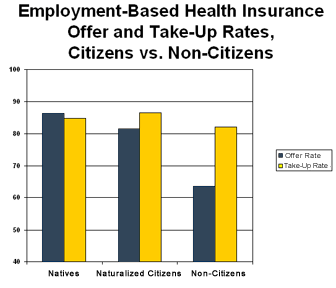|



The University of Michigan
555 South Forest Street
Third Floor
Ann Arbor, MI 48104-2531
T 734-936-9842
F 734-998-6341
/
|
 |
 |
Jobs Lacking Coverage Biggest Reason for Immigrants' Low Insured Rates
THE PROBLEM
Immigrants as a group are nearly three times more likely to be uninsured than native-born U.S. citizens. New research shows that, in contrast to results from previous studies, immigrants are not more likely than other workers to reject offers of health insurance from their employers. Research by a team led by University of Illinois at Chicago health economist Anthony LoSasso and funded by the Economic Research Initiative on the Uninsured (ERIU) at the University of Michigan indicates that immigrants are as likely to take-up an offer of health insurance as U.S. natives when it is offered in the workplace. Immigrants who work in firms offering health insurance are also just as likely to be eligible for that coverage as other workers.
LoSasso and colleagues show that the significant difference in coverage rates between U.S. natives and immigrants is explained mainly by the types of jobs immigrants hold and personal characteristics that affect coverage directly as well as indirectly through their effect on employment. This research also makes clear that the big differences in coverage rates are found for non-citizen immigrants, as opposed to naturalized citizens. Lack of citizenship is a big factor in determining coverage, but so too are education level and age. Non-citizens typically are younger, less educated, and working in less-skilled jobs, many of the same characteristics also attributed to uninsured U.S. citizens. The policy implications of the research, the authors suggest, call for remedies that focus on employers who are not offering coverage rather than on immigrants per se.
|
|
The economics behind these findings is pretty clear. Employers offer health insurance to recruit and retain workers with the skills they need. The problem for some groups of workers is that many low-paying jobs and jobs with small firms don't come with an offer of health insurance. Most working adults aren't eligible for public coverage, especially non-citizens. As a result, some workers who would take up an offer of health insurance at an actuarially fair rate are not able to get a job with such an offer. As this research shows, the problem for immigrant workers in this category is not about attitudes or preferences: immigrants are just as willing to work and to purchase available coverage as other groups. The problem is the reliance on employment-based coverage for adult workers. The cost of this coverage is increasingly out of reach for many workers and working families, independent of immigration status. In a sense, non-citizen immigrants are the "canary in the mine" for health insurance woes in the U.S. Their lack of access to employment-based coverage is more pronounced than other groups, but signals the vulnerability many face as employment-based coverage becomes more difficult and costly to secure.
From Catherine McLaughlin,
Ph.D., Professor at the University of Michigan and Director of
ERIU |
THE FACTS
-
Large differences in coverage rates between immigrants and native-born Americans are driven by very low rates of coverage for non-citizen immigrants. Non-citizens are 26 percent less likely than natives to have employer-sponsored coverage, whereas the gap is just 6 percent between native-born and naturalized citizens. The gap in employer-sponsored insurance between natives and non-citizens is driven mainly by the probability of working for firms offering such coverage.
-
Coverage gap differences are much greater for men than for women. Non-citizen men are 27 percent less likely to have employer-sponsored health insurance than are native-born U.S. men. Non-citizen women are 15 percent less likely to have employer coverage than are women born in the U.S. Native-born women are much less likely to have employer-sponsored coverage than native-born men (71% vs. 59%).
-
Education is the top reason for lower rate of employer health insurance among non-citizens. Non-citizens are more likely than naturalized or U.S. born citizens to lack a high school diploma (41% versus 19% for naturalized citizens and 10% for natives) and less likely to have a college degree (21% versus 32% and 27%). Age differences also play a significant role. On average, non-citizen immigrants are four years younger than natives.

Q&A with Anthony LoSasso, Ph.D.
Anthony LoSasso, Associate Professor of Health Policy & Administration at the University of Illinois at Chicago, is an economist who specializes in issues that intersect health and labor economics and health services research. LoSasso recently co-authored a paper, "Immigrants and Employer-sponsored Health Insurance," for ERIU.
Q: What are among the biggest myths about why immigrants are less likely to have employer-sponsored health insurance and why their uninsured rates are so high?
A: One myth is that wages mean more than fringe benefits to this group. There is no evidence that when employers offer coverage, immigrants choose not to take it up because they would prefer to earn the cash.
Q: Are immigrants less likely to be employed?
A: It's not that they are employed less. Employment rates are very similar. In fact, male immigrants, both naturalized citizens and non-citizens, have higher rates of employment than natives.
Q: Your paper shows that take-up rates among immigrants are not lower than other groups. Then why do they have much lower rates of employer-sponsored coverage than other groups? Are employers only hiring immigrants on a part-time basis or as contractors to avoid offering benefits?
A: There are still differences in take-up rates, but they are smaller and it does not appear to be a major factor. Eligibility also is not a factor. It really comes down to being offered health insurance. That is where we see the really large differences.
Q: What's the reason for the lower offering of ESI to immigrants? Or is it that immigrants seek jobs without offers of health insurance?
A: The firms employing immigrants tend to be smaller firms, with lower paying jobs. These are jobs that are more on the fringe of the job market, in firms that are probably new and that come and go.
Q: If immigrants are seeking jobs without employer-sponsored insurance, and it's not necessarily because they are going for wages over benefits, what does their lower rate of employer-sponsored health coverage reflect?
A: It reflects low education. It's working for small companies and it is age to some extent. Those really are the main factors. There are some small unexplained differences. It could be language, or a lot of different things that we can't accurately measure.
Q: What do these results mean for health policy?
A: The policy issue becomes how to encourage employers to offer this benefit in a way that doesn't bankrupt them. That would make everybody worse off because not only is there no health insurance but there is no wage because the company cannot profitably exist. So, it points to models that are being tried. There are states, like Maine's Dirigo Health, that are experimenting with trying to subsidize small employers' provision of health benefits. Another way to go could be to offer a sort of bare bones policy, which might not be what you or I would prefer to have, but again it is a choice of having something versus nothing.
Full
Q&A with Anthony LoSasso, Ph.D.
|
UPCOMING
|
This Research Highlight is the 11th in a series of research-based policy documents that address current questions and issues related to the health care coverage debate. The next Research Highlight will examine the influence of welfare reform and other factors on coverage trends for low-skilled women. Research Highlights can be found on ERIU's website at . |
Other ERIU Research Highlights
Summary of findings, data, and methods
ERIU Working Paper #38 (Adobe PDF)

Back to top

Funded by The Robert Wood Johnson Foundation, ERIU is
a five-year program shedding new light on the causes and consequences
of lack of coverage, and the crucial role that health insurance plays
in
shaping the U.S. labor market. The Foundation does not endorse the findings
of this or other independent research projects.
|
